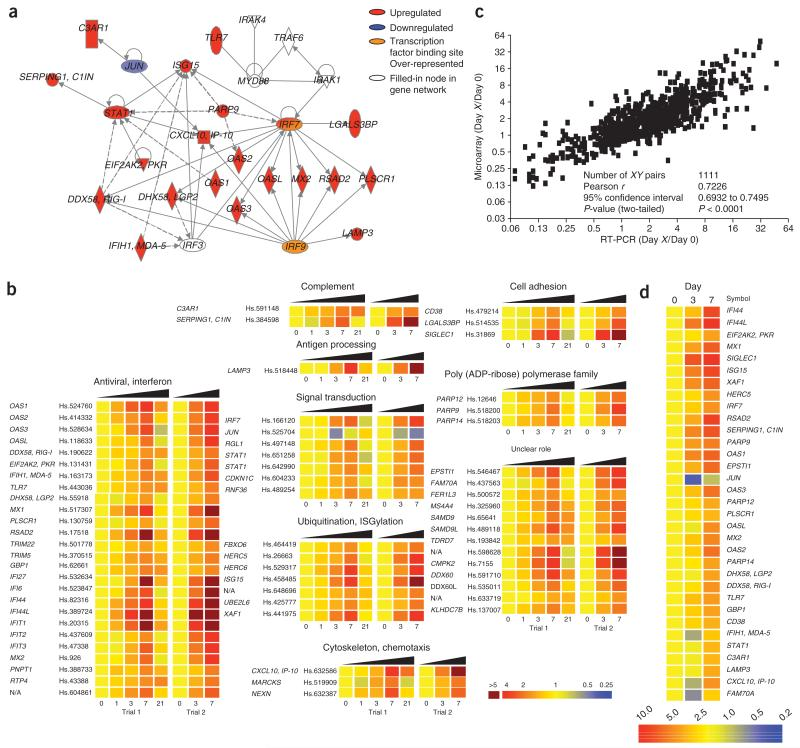Systems biology approach predicts immunogenicity of the yellow fever vaccine in humans.
A major challenge in vaccinology is to prospectively determine vaccine efficacy. Here we have used a systems biology approach to identify early gene 'signatures' that predicted immune responses in humans vaccinated with yellow fever vaccine YF-17D. Vaccination induced genes that regulate virus innate sensing and type I interferon production. Computational analyses identified a gene signature, including complement protein C1qB and eukaryotic translation initiation factor 2 alpha kinase 4-an orchestrator of the integrated stress response-that correlated with and predicted YF-17D CD8(+) T cell responses with up to 90% accuracy in an independent, blinded trial. A distinct signature, including B cell growth factor TNFRS17, predicted the neutralizing antibody response with up to 100% accuracy. These data highlight the utility of systems biology approaches in predicting vaccine efficacy.
Authors
Troy D Querec; Rama S Akondy; Eva K Lee; Weiping Cao; Helder I Nakaya; Dirk Teuwen; Ali Pirani; Kim Gernert; Jiusheng Deng; Bruz Marzolf; Kathleen Kennedy; Haiyan Wu; Soumaya Bennouna; Herold Oluoch; Joseph Miller; Ricardo Z Vencio; Mark Mulligan; Alan Aderem; Rafi Ahmed; Bali Pulendran
External link
Publication Year
Publication Journal
Associeted Project
Systems Vaccinology
Lista de serviços
-
Genomic analyses reveal broad impact of miR-137 on genes associated with malignant transformation and neuronal differentiation in glioblastoma cells.Genomic analyses reveal broad impact of miR-137 on genes associated with malignant transformation and neuronal differentiation in glioblastoma cells.
-
RNA-Binding Protein Musashi1 Is a Central Regulator of Adhesion Pathways in Glioblastoma.RNA-Binding Protein Musashi1 Is a Central Regulator of Adhesion Pathways in Glioblastoma.
-
MicroRNA Transcriptome Profiling in Heart of Trypanosoma cruzi-Infected Mice: Parasitological and Cardiological Outcomes.MicroRNA Transcriptome Profiling in Heart of Trypanosoma cruzi-Infected Mice: Parasitological and Cardiological Outcomes.
-
Genome mapping and expression analyses of human intronic noncoding RNAs reveal tissue-specific patterns and enrichment in genes related to regulation of transcription.Genome mapping and expression analyses of human intronic noncoding RNAs reveal tissue-specific patterns and enrichment in genes related to regulation of transcription.
-
Antimicrobial peptide LL-37 participates in the transcriptional regulation of melanoma cells.Antimicrobial peptide LL-37 participates in the transcriptional regulation of melanoma cells.
-
Down-regulation of 14q32-encoded miRNAs and tumor suppressor role for miR-654-3p in papillary thyroid cancer.Down-regulation of 14q32-encoded miRNAs and tumor suppressor role for miR-654-3p in papillary thyroid cancer.
-
Integration of miRNA and gene expression profiles suggest a role for miRNAs in the pathobiological processes of acute Trypanosoma cruzi infection.Integration of miRNA and gene expression profiles suggest a role for miRNAs in the pathobiological processes of acute Trypanosoma cruzi infection.
-
Integrative Biology Approaches Applied to Human DiseasesIntegrative Biology Approaches Applied to Human Diseases
-
Proteomics reveals disturbances in the immune response and energy metabolism of monocytes from patients with septic shock.Proteomics reveals disturbances in the immune response and energy metabolism of monocytes from patients with septic shock.
-
Genomics, epigenomics and pharmacogenomics of Familial Hypercholesterolemia (FHBGEP): A study protocol.Genomics, epigenomics and pharmacogenomics of Familial Hypercholesterolemia (FHBGEP): A study protocol.
-
Melatonin-Index as a biomarker for predicting the distribution of presymptomatic and asymptomatic SARS-CoV-2 carriersMelatonin-Index as a biomarker for predicting the distribution of presymptomatic and asymptomatic SARS-CoV-2 carriers
-
Profiling plasma-extracellular vesicle proteins and microRNAs in diabetes onset in middle-aged male participants in the ELSA-Brasil study.Profiling plasma-extracellular vesicle proteins and microRNAs in diabetes onset in middle-aged male participants in the ELSA-Brasil study.
-
Big Data and machine learning in cancer theranosticsBig Data and machine learning in cancer theranostics
-
Genomic positional conservation identifies topological anchor point RNAs linked to developmental loci.Genomic positional conservation identifies topological anchor point RNAs linked to developmental loci.
-
Integrative systems immunology uncovers molecular networks of the cell cycle that stratify COVID-19 severityIntegrative systems immunology uncovers molecular networks of the cell cycle that stratify COVID-19 severity

